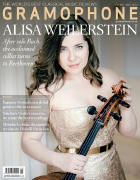Texte paru dans: / Appeared in: |
|
|
Outil de traduction |
|
|
Hungarian-born Klára Würtz is a matured child prodigy with a difference: her pianism sidesteps overt display or affectedness in favour of purely musical values. Würtz’s performances have ‘disarming freshness’, as one commentator has put it, which throws our listening emphases away from her and back on to the music. Best known for her recordings on Brilliant Classics, Würtz is, in this writer’s view, one of the best pianist/ musicians currently performing and the fact that she’s so infrequently mentioned in dispatches is a critical oversight. In the pages of Gramophone, Jed Distler and Bryce Morrison have been rare exceptions (and apologies for any other references that I’ve missed). So, cards on the table, what Würtz’s Goldbergs offer is calm appreciation of the music’s manifold beauties. After the repeated first half of the Aria (repeats are observed throughout the performance), Würtz adds a small degree of pressure as if to explain what has just passed and what is still to come. The first variation is buoyant and forceful, the second driven by a keenly pointed accompaniment and for the second half’s repeat much active counterpoint. Var 3 enjoys superbly balanced voices, just as the fourth (where the repeats add extra emphases) and fifth show mind and fingers in perfect accord. Come the gently swaying sixth variation, top line and accompaniment are equally balanced, whereas the dance element extends to Var 7. The toccatalike eighth suggests a Gouldian level of rhythmic precision followed by a more tranquil Canone alla terza, where Würtz’s centredness recalls the worlds of Solomon or Lipatti (neither of whom recorded the work). Immaculate trills distinguish Var 10, followed by Var 11’s closely knit dialogue where, for the first repeat, Würtz allows herself some expressive licence in the way she desynchronises her hands. All voices are luminous for Var 12; then there’s the exquisite 13th variation, where Würtz employs some subtle rubato, much aided by the emergence of crisply articulated subsidiary lines – the repeated second half is a joy to behold. The drama of Var 14, with its darting figurations like a racecourse etching, is dazzling before the sun unexpectedly clouds over for Var 15, which seems, to these ears, to anticipate the world of late Beethoven. A flamboyant arpeggio announces the Overture (Var 16), here resembling the world of Bach’s keyboard suites, which in turn launches into a fughetta followed by a variation cast along similar lines where repeats signal shifting colours. Then there’s the elegant, minuet-like Canone alla sexta, almost Handelian in Würtz’s hands, as is the 19th variation, before the étude-like Var 20, with its helter-skelter runs, marks a sudden change of mood. But then, as if on a whim, darkness descends as Würtz brings great weight to bear on Var 21, a majestic essay, before Var 22 arrives, and with it, a far lighter mood. Var 23 is gaily ornamental (Würtz’s nimbleness again recalls Gould) whereas the next variation resembles a gentle lullaby, as well it might before the ‘Black Pearl’ (Var 25), a searching Adagio (7'58" as presented here) that dons Beethovenian depth but without the least suggestion of pretension. This for me is truly great piano-playing, a direct route to the soul with no tiresome diversions along the way. And so to the Goldbergs’ celebratory last lap, starting with the swift fluidity of Var 26, then a proud step down for Canona alla nona, a true duet, the star-like glistening of Var 28, immaculately turned in Würtz’s hands … hands that excitedly alternate in Var 29 before the final variation, the Quodlibet, a sort of themebased amalgam of sacred and popular songs. Würtz’s performance is peaceful and restrained, a perfect lead-in to the Aria’s return and our journey’s close. I’ve heard a handful of Golbergs that are as good as this (Beatrice Rana, for one – Warner, 4/17), but none that are better.
|
|




